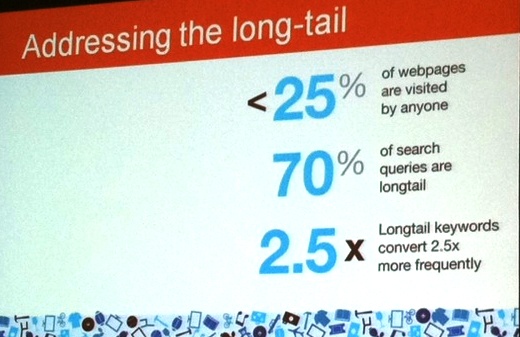The evolving search space is driving a necessary shift away from rankings as an SEO metric, but marketers have still been focused on keywords for visibility across search and social networks. At ad:tech San Francisco, David Rodnitzky, CEO of PPC Associates, spoke about why he thinks longtail search optimization is dead in the personalized, social searchscape – especially when it comes to paid search campaigns (though not all the search experts agreed with him!).
Rodnitzky gave a nice refresher on what constitutes longtail search: low volume queries with high purchase intent. The most common longtail keywords are head terms combined geo-modifiers, SKUs, misspellings and/or adjectives. He went on to describe how Google search changes have rendered these modifiers null and void.
Here’s an overview of his claims:
- Geo-modifiers: Google’s location-sensitive personalization filters can produce search result specific to locations, whether or not a site (or search ad) is optimized with geo-specific longtail forms of keyphrases.
- SKUs: Google Instant search reduces query length (a search feature he says negatively impacts all longtail search) and Google’s broad match algorithm can take the focus off of SKUs among searchers.
- Misspellings: Updates to Google’s quality algorithms negatively affect sites with typos and grammar issues. (Matt Cutts has a related Webmaster Help video.)
- Adjectives: Rodnitzsky pointed, again, to Google Instant search and broad term match as reasons why adjectives may have less of a role in search visibility.
 While he was confident in the death of longtail, some other ad:tech search experts and attendees strongly disagreed. Mitra Naemi, director of marketing, SEO and social media for Tiny Prints, affirmed her faith in statistics, indicating 70 percent of search queries are longtail during her presentation on how to gain an SEO edge in the evolving search ecosystem. Additionally, one PPC marketer in the audience challenged Rodnitzky’s argument, indicating that her company still finds the most profitable paid search clicks come from longtail terms.
While he was confident in the death of longtail, some other ad:tech search experts and attendees strongly disagreed. Mitra Naemi, director of marketing, SEO and social media for Tiny Prints, affirmed her faith in statistics, indicating 70 percent of search queries are longtail during her presentation on how to gain an SEO edge in the evolving search ecosystem. Additionally, one PPC marketer in the audience challenged Rodnitzky’s argument, indicating that her company still finds the most profitable paid search clicks come from longtail terms.Regardless of where marketers stand on the debate about longtail keywords, Rodnitzky provided some tips on how he believes businesses can make the most of search engine marketing:
1. Focus on a brand’s money terms. “Ninety-five of your revenue will come from five percent of your keywords. Spend a lot of time focusing on the top five percent.”
2. Landing page content is essential. In light of the rise of keyword tools, “There are no ‘secret keywords’ that only your business will know about. You and your competitors are all going for the same keywords, so create relevant pages that will make users want to choose you.”
3. Focus on tracking. “A company with the wrong tracking buys the wrong PPC keywords.”
4. Think of “widetail” visibility instead of longtail search. “Don’t worry about longtail pay per click on Google, but instead, spread your paid campaigns across social, video and many different channels.”
His tips may come in handy for PPC marketers, but businesses might not want to ditch their longtail phrases for SEO just yet. As Brafton has reported, Conductor research shows longtail keywords still boost SEO, and traffic from these niche phrases tends to boast 2.5 times the conversion rates of visitors from head terms.



